TOMATO CATCH-UP - Newsletter Issue 270 - September 2024
Your monthly source of information on topics that concern corporate treasurers and IT experts.
This newsletter is in English or German, depending on the source.
Introduction
Are you already thinking of the intense work of the upcoming busy months? An article on Work Smarter (in German) shows 4 simple exercises that can help you engage in deep work and be more efficient. Among these, they recommend the Pomodoro technique we introduced in our newsletter a few months ago.
This technique is a time-management method developed by Francesco Cirillo in the late 1980s.
- Try to endure boredom, which will help you train your ability to concentrate
«dem Reiz der ständigen Ablenkung widerstehen, dies trainiert die Konzentrationsfähigkeit» - Turn off notifications and/or delete smart apps that distract you
«welche Kanäle sind wirklich notwendig? Behalte maximal 3 Kanäle.
Sicher wird es Nachteile haben, keine Frage. Gewinnen Sie dafür etwas Wertvolles – ZEIT» - Make time for deep work: block at least 2 hours daily in your calendar or in-depth work
«länger als drei bis vier Stunden am Tag kann man sich nicht konzentrieren» - Use the Pomodoro technique
«Timer auf 25 Minuten stellen und durcharbeiten bis es klingelt. 5 Minuten Pause (kein Handy, keine Messages). Wiederhole diese Schritte weitere 2 Mal. Gratulieren Sie sich, Sie haben zwei Stunden konzentriert gearbeitet»
Source in German Work Smarter
Source in English https://www.pomodorotechnique.com
This month’s Catch-Up includes these topics: Commodity Prices and Treasury, Instant Payments in der Schweiz, EBICS V 4.0, Top Banks in 2024, e-Invoicing in Europe, EU Accessibility Act (EAA), Capitalism, and more.
Remember that for any challenge related to your financial issues, you can ask Martin Schneider for a discussion that will clarify it. Contact Martin via email or call +41 44 814 2001.

image: "Pomodoro [day 61]" by gerlos is licensed under CC BY-ND 2.0
- Energy Price Fluctuation - Treasury Hedges & Supports
- Who is Who in Treasury on a Simple Map
- Instant Payments Schweiz ab 20.08.2024
- EBICS V 4.0: EBICS SC has Launched a Request for Comments
- Die Top-Banken im DE-Firmenkundengeschäft 2024
- e-Invoicing in Europe from 2025 Onwards
- EU Accessibility Act and Implications for Banks
- Book Tip: Weltreise eines Kapitalisten
- Termine & Events
- From the Desk of Tomato
1. Energy Price Fluctuation - Treasury Hedges & Supports
Stable prices, a basic asset for budgeting, are essential for clients and suppliers. Fixed currency prices ended at Bretton Wood in 1971, when the US terminated the convertibility of the dollar to gold and devalued its currency. Swiss National Bank hold Swiss Franc stable at EUR CHF 1.20 from 2011 until 2015.
Treasurers know that currencies and interest need to be continuously monitored and hedged. This ensures clients and suppliers do not lose the production and sales margin due to currency losses. The same applies to true for commodity prices, especially energy prices, which are at different levels around the world.
In some companies, energy prices have risen from 2% to 5% since 2021. For example, in a company with EUR 250 annual sales, the increase of 5% to the production costs is approximately 10 Mio.
This is a huge amount, for this is worthwhile interested treasurers can visit courses, gain know-how, gain experience.
Martin Schneider is an experienced commodity trader and expert in this field. If you would like support, please do not hesitate to contact him.
Review Bretton Wood’s 6-page PDF report by Rod Oram. He is a journalist who specializes in political, economic and corporate issues and a regular broadcaster of the New Zealand Centre for Global Studies.
The following graph depicts the prices for oil, gas and electricity from 2006 to 2024. Source: Visit Clifford Talbot chart for more insights.
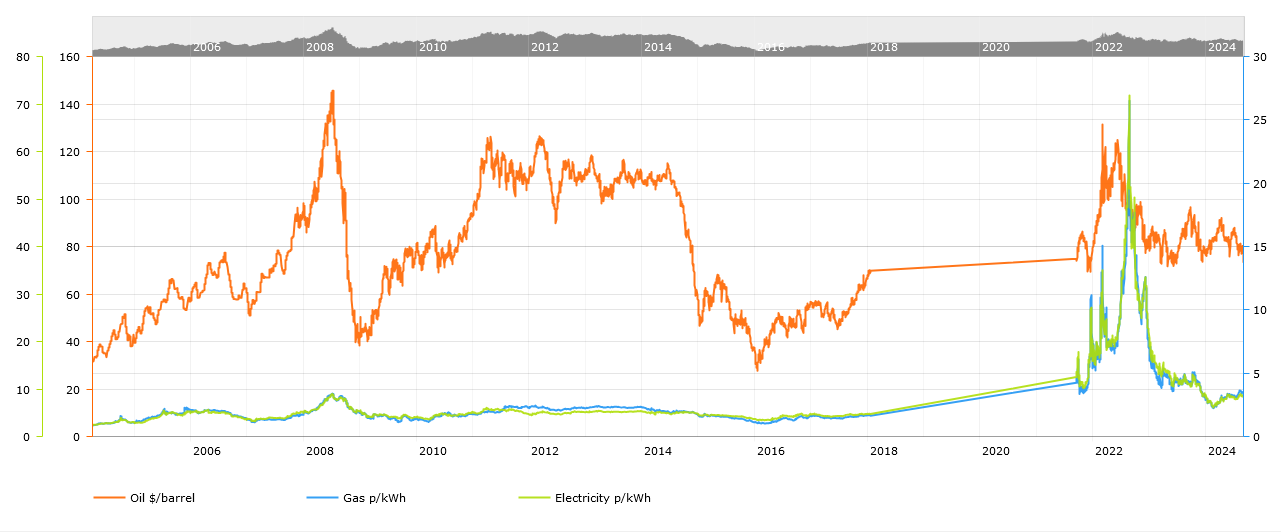
Treasury can actively smoothen price moves with these actions. Source tomato.ch
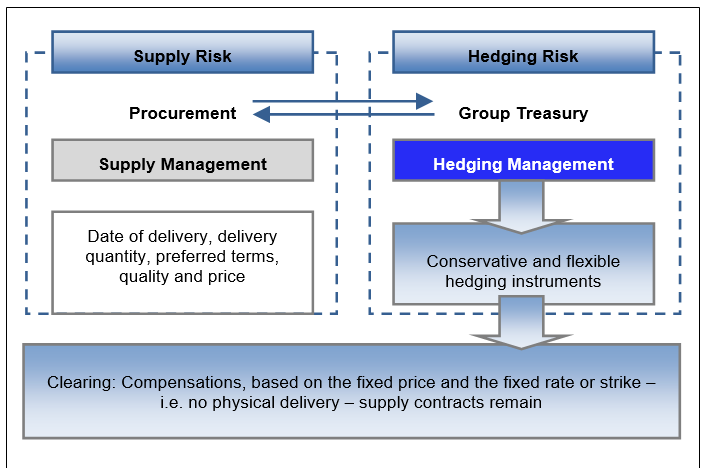
2. Who is Who in Treasury on a Simple Map
Do you ever wonder who is active in the various segments of treasury? We from Tomato often check this moving map for inspiration.
Source Simply Treasury by François Masquelier.
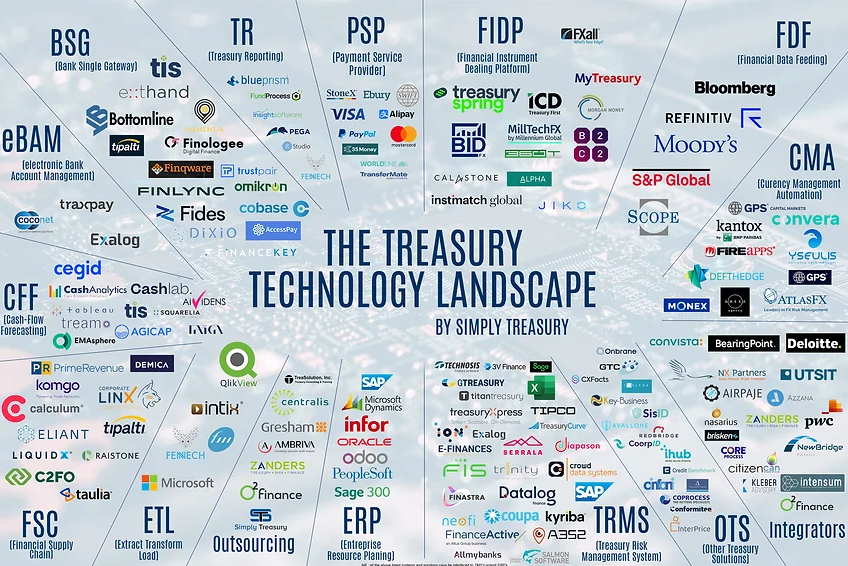
3. Instant Payments Schweiz ab 20.08.2024
Technisch ausführen können nur wenige Bankinstitute Instant Payments (Bild unten). Circa 60 Banken können Instant Payments empfangen. Zwei regional tätige Banken bieten die Ausführung von Instant Payments kostenfrei an.
Tomato Konklusion für Treasury
- Bei «vergessenen Zahlungen» (nicht in der Monatsplanung berücksichtigt) machen Instant Payments Sinn
- Viele der Corporates sind mit der grössten Schweizer Bank UBS/CS verbunden. Die Gebühr von CHF 5 ist tragbar
- 99% der Lieferanten-Zahlgänge werden hoffentlich aus dem ERP (wie SAP Format F110) gesteuert. Dies basierend auf einer internen Compliance Vorgabe, dass die Lieferanten Details nur aus dem ERP zu steuern sind
Tomato Konklusion für Privatpersonen:
- Fünf Millionen Menschen mit Bankkonto in der Schweiz sind aktive Twint-App-Nutzer und nutzen die Sofort-Ausführungen seit einigen Jahren via Smartphone.
- Zum Überweisen des Geldbetrages muss man nur die Mobile Telefonnummer kennen, nicht das Bankkonto.
- Dass die Twint-Nutzer den Betrag am folgenden Bankwerkstag belastet oder gutgeschrieben erhalten, ist für private Personen weniger relevant.
Für den Privatkunden wäre es nur für grosse Beträge wichtig, auf Instant Payment zu wechseln.
Quellen von einigen unserer besuchten Sites: BEKB ist bereit; Hypothekarbank Lenzburg ist bereit; UBS ist bereit; SGKB ist bereit
Tabelle zum Versand von Instant - Payment – Zahlungen: kostenfrei in grün, mit Gebühren rot unterlegt.
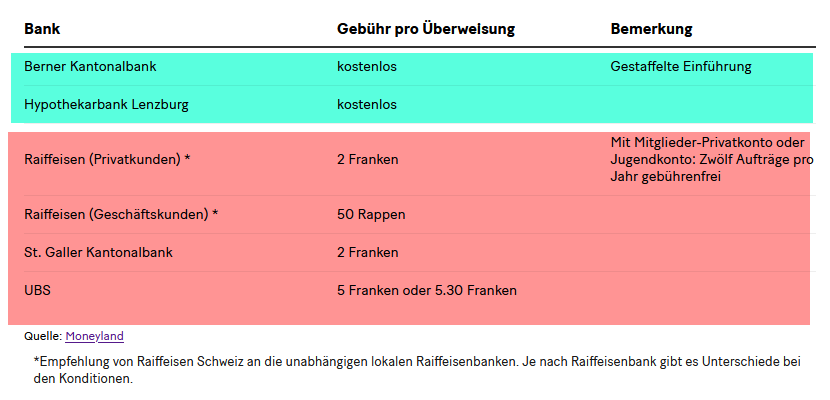
4. EBICS V 4.0: has Launched a Request for Comments
EBICS V 3.0 was launched in 2018 to harmonize interpretation and standardization of business transactions. The EBICS SC is now planning the specification of a possible new, future-proof EBICS version 4.0. This version is expected to improve the standard from the customer perspective and security.
From 19.06. ending 16.09.2024, EBICS SC has launched a Request for Comments (RfC).
Where alternatives are formulated, EBICS requests opinions on a preference or, if applicable, on an alternative not yet mentioned.
Further information can be found under the new section EBICS V 4.0 - RfC.
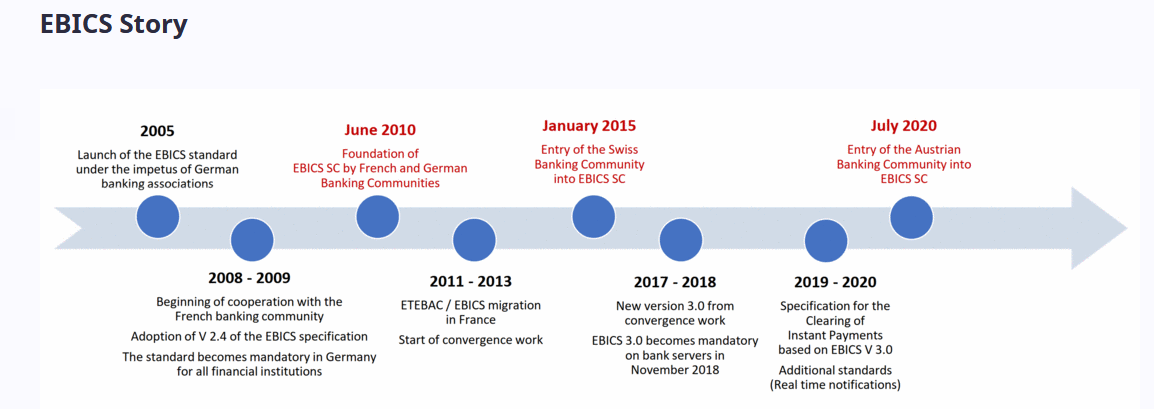
5. Die Top-Banken im DE-Firmenkundengeschäft 2024
Bericht aus DerTreasurer. Die aktuelle Bankenstudie zeigt wie Unternehmen die Zusammenarbeit mit ihren Banken bewerten. Befragt wurden in diesem Jahr 200 CFOs, Finanzmanager und Treasurer. Die ersten sieben Plätze sind unverändert wie im Jahr 2023. Link der 2023 Grafik in den Tomato News Sept-2023
Grafik 2024 und den ganzen Bericht lesen Sie in DerTreasurer
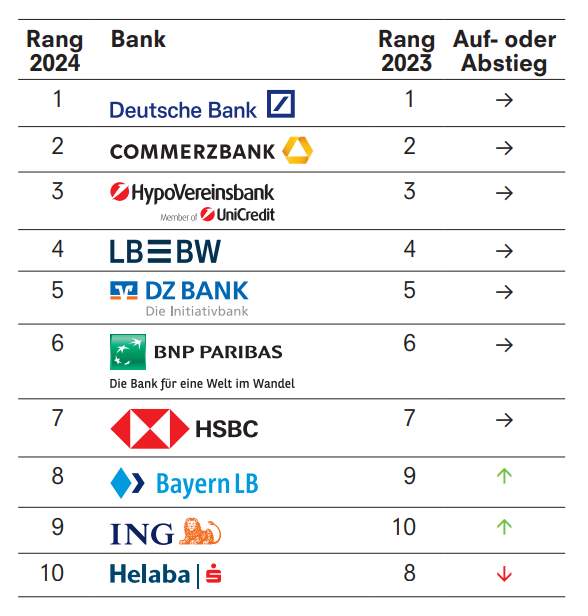
6. e-Invoicing in Europe from 2025 Onwards
Since the implementation of the e-Invoicing Directive 2014/55/EU in April 2020, all public administrations across the European Union (EU) comply with the European Standard on e-Invoicing.
Read also in English and German Tomato News Oct-2023
All companies will receive e-invoices as of 2025. Formats are Zugferd, X-bill and XML-formats Cross Industry Invoice (CII) und Universal Business Language (UBL).
Factsheets can be found on the European Commission site for each member state and other countries in their respective language.
Bevorzugen Sie Deutsch? Lesen Sie diese Quelle mit der folgenden Grafik https://edicomgroup.de/

7. EU Accessibility Act and Implications for Banks
The Accessibility Act (EAA) defines “persons with disabilities" as persons who have long-term physical, mental, intellectual, or sensory impairments.
The EU Accessibility Act is a Directive that harmonizes the accessibility requirements for products and services across the EU. It covers sectors such as e-commerce, electronic communications, and consumer banking services. The Act needs to be transposed into national law, will apply in June 28, 2025 and will have significant implications for banks.
The article lists all services. How will the banking sector be impacted?
- Online presence redesign: websites, services, and online banking solutions offered on mobile devices must be perceivable, operable, understandable, and robust.
- Comprehensible information: language must not exceed level B2. This means banks need to review and adjust their client contracts and information.
8. Book Tip: Weltreise eines Kapitalisten
Rainer Zitelmann, Historiker, Soziologe und Millonär hat in 20 Monaten 30 Länder auf vier Kontinenten bereist und legte dabei 260.000 Kilometer zurück. Er zeigt in seinem Buch «Weltreise eines Kapitalisten: Auf der Suche nach den Ursachen von Armut und Reichtum», dass in Ländern in denen Reichtum positiv gesehen wird, der Kapitalismus die Welt zu einem nie dagewesenen Wohlstand und Fortschritt geführt hat. Die Anzahl der Armen hat sich drastisch reduziert. Dagegen hat der Sozialismus überall katastrophale Zustände geschaffen.
- In einigen Ländern, wie z.B. Frankreich, scheint der Kapitalismus einen schlechten Ruf zu haben
- In der Schweiz und Singapur wird der Kapitalismus kritisch gesehen. Anmerkung: Diese beiden Länder belegen die ersten Plätze im "Index of Economic Freedom»
- Die USA gilt nicht mehr das kapitalistische Musterland
- Reichtum wird ebenfalls positiv gesehen in Polen, Korea und Vietnam. Diese Länder wachsen wirtschaftlich, Durchschnittsbürger und Ärmere profitieren
Zitelmann erkennt, wie schnell drastische Entscheide zu enormem Wachstum führen können. Falsche politische Vorgaben richten hingegen schlimme Schäden an.

9. Termine & Events
Heinrich Heine (1797-1856): Bildung bleibt, Geld ist rund und rollt weg.
- Sep. 16 – 17, 2024: MoneyLive North America, Chicago, USA
- Sep. 18, 20024: Jahrestreffen Schweizer Treasurer in Rotkreuz, at the Railway grid Zurich-Lucerne
- Sep. 23 – 24, 2024: Cours intensif Swiss GAAP RPC - formation de 2 jours axée sur des exemples pratiques et l’échange d’expériences, de PwC à Genève, Suisse
- Sep. 23 – 24, 2024: Payments Leaders’ Summit Europe, Amsterdam, The Netherlands
- Sep. 24, 2024: Smarter Payments Summit, Manchester, UK
- Sep. 25 – 26, 2024: The Central Bank AI Conference, London, UK
- Oct. 2 – 4, 2024: EuroFinance, International Treasury Management, Copenhagen, Denmark
- Oct. 3, 2024: PwC Digital Leadership Summit 2024, Zürich, Switzerland
- Oct. 8 – 9, 2024: Digital Integration In Wealth Management DACH 2024, Zürich, Switzerland
- Nov. 7, 2024: ACTA Tech Day 2024, Wien, in Deutsch, physisch
- Nov. 10 – 11, 2024: 15th NextGen Payments & RegTech Forum, Austin, Texas, USA
- Nov. 13 – 15, 2024: IACT 2024 Annual Treasury Management Conference, Dublin, Ireland
- Nov. 21, 2024: Le Marche Monétaire de la BNSà Genève
- Nov. 27 – 28, 2024: Structured Finance in German, physical, ICS Messe Stuttgart
10. From the Desk of Tomato
Wenn internationale Kollegen und Freunde in die Schweiz ziehen, möchten sie wissen, welche Bundes- und Gemeindesteuern zu bezahlen sind, wie sie eine Wohnung mieten können, wie die betriebliche Pensionskasse funktioniert**, oder welche Kosten nach der Gehaltszahlung auf sie zukommen.
Gemeinde- und Bundessteuern, Krankenversicherung, Arztbesuche, Fernsehgebühren usw. - all das summiert sich.
Wichtig zu wissen: Viele dieser Kosten sind staatlich reguliert. Sie unterliegen nicht dem Wettbewerb.
Obwohl die Schweiz in Rankings zur internationalen Wettbewerbsfähigkeit einen Spitzenplatz einnimmt, kontrolliert der Staat 29 % aller Preise. Das ist mehr als in jedem anderen europäischen Land. Der Durchschnitt in den EU-Ländern liegt bei 12 %. Zum Beispiel: Niederlande 20%, Frankreich 15%, Deutschland 13%, Österreich 9% und Italien 7%.
Folgend einige Regularien, die die Lebenshaltungskosten des Einzelnen erhöhen:
- Eine Krankenversicherung zu haben ist verpflichtend. Sie werden von privaten Unternehmen betrieben, deren Preise vom Parlament beeinflusst werden.
- Die Preise staatlicher Unternehmen wie Bundesbahnen, Post, Swisscom und Skyguide obliegen keinem Wettbewerb.
- Kantone, Gemeinden, Kommunen sind beteiligt an den Versorgungsunternehmen und regulieren die Preise einmal jährlich.
- Bei Hypotheken und Wohnungsmieten ist ein vierteljährlicher staatlicher Bericht der Referenzzinssatz. Dies ermöglicht den Banken eine Anpassung der Finanzierung und den Immobilienbesitzern eine Senkung oder Erhöhung der Wohnungskosten für die nächste Vertragslaufzeit.
- Rente**: Die Schweiz kennt das 3- Säulen-Renten-System: 1) die staatliche Rente (für alle verpflichtend), 2) die Betriebspensionskasse (für alle verpflichtend mit Vorgaben vom Staat), 3) die privaten Ersparnissee (höchst Sparbeiträge steuerlich in Abzug zu bringen)
Inspiriert von einem NZZ-Bericht.
Do you prefer English?
When foreigners move to Switzerland, they want to know what federal and local taxes they will have to pay, how they will rent an apartment or what costs they will incur after they receive salary is paid. Municipal and federal taxes, health insurance, visits to the doctor, television fees, etc. all add up. Even more important, many of these are state regulated so that they don’t face competition and oversight.
While Switzerland ranks high in international competitiveness rankings, the state controls 29% of all prices. That’s more than any other European country. The average in EU countries is 12%.
Here are some regulations that add to individuals’ cost of living:
- Health insurance is mandatory and administered by private companies.
- Prices of state-owned companies such as Federal Railways, Post, Swisscom, Skyguide don’t face competition so their incentive to be more efficient is low.
- Local governments own utility companies and regulate pricing.
- Mortgages and apartment rentals: A quarterly state report is the reference interest rate. This allows banks to adjust financing, property owners to reduce or increase apartment costs on the next contract term)
Looking forward to your comments.
Enjoy late summer days from the Tomato Atelier
